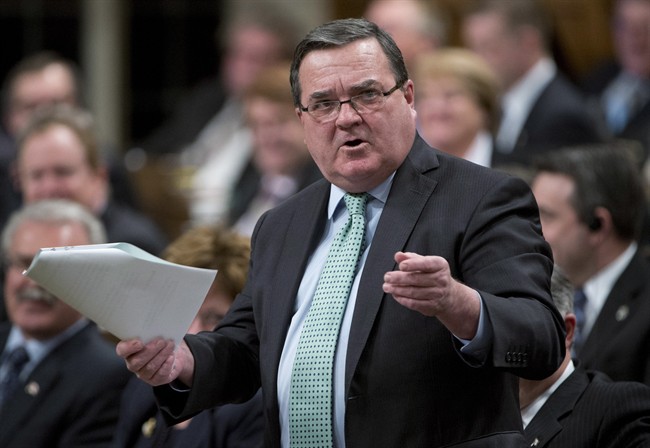OTTAWA – Finance Minister Jim Flaherty is coming under fire for using his position to pressure a private sector mortgage lender to raise its interest rates.

“That’s Banana Republic behaviour,” said NDP Leader Tom Mulcair, who added the minister has no business interfering with the free marketplace.
Liberal interim leader Bob Rae called the minister’s actions “ridiculous” and in essence working to increase borrowing costs for Canadians.
“Either we have a market or we don’t,” he said. “The banks have huge profits. The idea that they shouldn’t be able to give a break to consumers is ridiculous and the idea that the Minister of Finance would basically be trying to create some kind of a cartel among the banks and the financial institutions as to what they can offer consumers by way of interest rates is I think completely inappropriate, completely wrong actually.”
On Tuesday, Flaherty admitted he asked a member of his staff to phone Manulife Financial Corp. (TSX:MFC) after it had cut its posted rate for five-year fixed mortgages to 2.89 per cent from 3.09 per cent.
The company quickly reversed its decision, saying only that “after consulting with the Department of Finance, Manulife Bank has withdrawn the promotional campaign and reverted to our previous posted rate.”
It’s the second time in a few weeks that Flaherty interfered in the mortgage market. Earlier in the month, he called the Bank of Montreal (TSX:BMO) after it had dropped its posted five-year rate to 2.99 per cent, but on that occasion BMO did not reverse itself.

Get weekly money news
We encourage prudent lending practices, we don’t want a race to the bottom on mortgage rates by our financial institutions… Finance Minister Jim Flaherty
Afterwards, he thanked other institutions for not following the BMO lead, at least until Manulife’s brief discounted offering.
Since the government tightened mortgage rates in July, Canada’s housing market has slowed considerably in terms of sales, starts and even prices. Two weeks ago, the Bank of Canada signalled it was no longer as concerned about Canadian debt levels, saying it does not expect the situation to worse appreciably from its current high levels.
Slowing home sales and credit, however, has intensified competition among financial institutions and banks for a dwindling slice of the mortgage market, a relatively safe and lucrative sector of the industry.
Flaherty told reporters he acted with Manulife to keep lenders from taking on risky loans and was happy with the company’s subsequent decision.
“As I said before, we encourage prudent lending practices, we don’t want a race to the bottom on mortgage rates by our financial institutions so I’m pleased at their response,” he said.
“I had one of my staff call them and indicate my displeasure, which is the same thing I did with the BMO except I called myself.”
But the opposition leaders said the government has no right to interfere in the free marketplace once it sets the ground-rules. To act otherwise is to substitute its opinion for that of the players in the market.
“That company is operating completely with full respect of the law, they see an advantage in attracting clients at this rate, why shouldn’t they go out to do that?” Mulcair asked.
“It’s none of his business. It’s the minister’s opinion, it’s nuts. We’ve never seen this before.”
Flaherty has for the past several years complained that Canadians are borrowing beyond their means, particularly on mortgages, and worried they will be trapped once interest rates start to rise.
To slow down borrowing, he has tightened the rules on four occasions, reducing the amortization rate to 25 years from a historic high of 40 years, which was reached under Flaherty’s watch.
As well, he has asked the federal watchdog on financial institutions to enact stricter lending practices and controls.
While the first three attempts did little to slow down the housing and credit growth, the last move in July seemed to accomplish the trick. The market has been on a steady downward slide ever since, with analysts predicted prices may fall between 10 per cent and 25 per cent over the next few years.
The central bank notes that credit growth has also slowed, adding it expects household debt to disposable income to remain at or near the record level of 166 per cent, where it has been the past two quarters.
But while Ottawa has apparently succeeded in pricking the housing bubble, one of the offshoots of the policy has been to slow down economic growth to below two per cent.







Comments